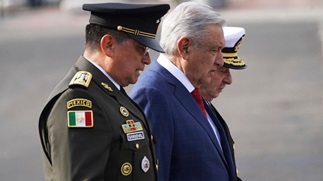A massive trove of emails from Mexico’s Defence Department is among electronic communications taken by a group of hackers from military and police agencies across several Latin American countries, Mexico’s president has confirmed.
The acknowledgement by President Andrés Manuel López Obrador comes after Chile’s government said last week that emails had been taken from its Joint Chiefs of Staff.
The Mexican president spoke at his daily news conference following a local media report that the hack revealed previously unknown details about a health scare he had in January.
López Obrador downplayed the hack, saying that “there’s nothing that isn’t known.” He said the intrusion apparently occurred during a change of Defence Department systems. But Chile was so concerned by the breach to its own systems that it called its defence minister back from the United States last week where she was attending the United Nations General Assembly with President Gabriel Boric.
The 10 terabytes of data taken by the group also include emails from the militaries in El Salvador, Peru and Colombia, as well as El Salvador’s National Police. The Mexico portion of the data appeared to be the largest.
A group of anonymous, self-described social justice warriors who call themselves Guacamaya say they use hacking to expose injustice and corruption in defence of Indigenous peoples. Hackers using the same name previously hacked and released the emails of a mining company long accused of human rights and environmental abuses in Guatemala.
In a statement accompanying the most recent action, the group complained of the plundering of Latin America, which it refers to as Abya Yala, by colonisers and the continuing extractivist goals of the “Global North.” The group issued a 1,400-word comunique saying that the militaries and police of Latin American countries, often with extensive training by the United States, are used by governments “to keep their inhabitants prisoner.” “The police minimise the risk that the people exercise their honourable right to protest, to destroy the system that oppresses them,” the group wrote.








